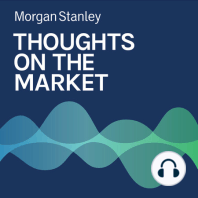3 min listen

Andrew Sheets: Upgrades and Downgrades in Corporate Credit
Andrew Sheets: Upgrades and Downgrades in Corporate Credit
ratings:
Length:
3 minutes
Released:
Nov 3, 2023
Format:
Podcast episode
Description
As the majority of the stress from higher rates falls on weaker borrowers, investors should consider moving up in quality.----- Transcript -----Welcome to Thoughts on the Market. I'm Andrew Sheets, Global Head of Corporate Credit Research for Morgan Stanley. Along with my colleagues bringing you a variety of perspectives, I'll be talking about trends across the global investment landscape and how we put those ideas together. It's Friday, November 3rd at 2 p.m. in London. Downgrades in the loan market are moderating after a spike in 2022. That's good news overall, but still suggests an environment that will reward a higher quality bias in high yield investing. After rising throughout last year, net downgrade activity for U.S. leveraged loans, which represent corporate loans to below investment grade borrowers, have declined about 50%. The most extreme downgrades where issuers fall to a triple C rating, have moderated the most, while triple C upgrades have become more frequent, as companies have successfully refinanced upcoming debt. Fewer net downgrades, and especially less movement into this riskiest triple C cohort, is good news. And we think it's consistent with the idea that despite a near doubling of borrowing costs over the last two years, default rates will only rise to about average levels and not something higher and more alarming. But within this activity, we think there's also a message, the majority of the stress from those higher rates is falling on weaker borrowers. Investors should look to move up in quality. Why do we think this? When interest rates rise, the impact on borrowers happens gradually, rather than all at once, since borrowers are still likely to have some debt outstanding that was taken out when rates were lower. That means that today's financial metrics and ratings may still not fully reflect the impact of the unusually fast rise in borrowing costs. That still to come impact, could fall most heavily on loan issuers rated B3/B-, the last step above the lowest triple C tier. My colleagues Vishwas Patkar and Joyce Jiang of the U.S. Credit Strategy team estimate that by the end of this year, over 1/3 of these issuers could have an interest coverage ratio, which represents the ratio of your cash flow to your borrowing costs, below 1.3x, even if their earnings are flat. In a scenario where growth is even weaker this year, that share would be even higher. And despite these low single B's facing the most risk from higher borrowing costs, in our view, markets aren't charging a particularly large premium to avoid them. The extra spread that an investor gets from moving down to a B- credit from the notches above, is near the lowest of the last ten years. And our up and quality bias isn't just about playing defense, as higher rated issuers are generally seeing better ratings transition trends. Double B rated credits are posting more upgrades than downgrades and outperforming lower rated single B's or triple C's. And even higher rated triple B credits are posting an even larger volume of upgrades relative to downgrades over the last 12 months. Ratings actions are stabilizing and suggest extreme outcomes for default rates are likely to be avoided. But given fundamentals and pricing, moving up in quality still makes sense. Thanks for listening. Subscribe to Thoughts on the Market on Apple Podcasts or wherever you listen and leave us a review. We'd love to hear from you.
Released:
Nov 3, 2023
Format:
Podcast episode
Titles in the series (100)
Mike Wilson: Why Trade Tensions Are Only Part of the Story by Thoughts on the Market